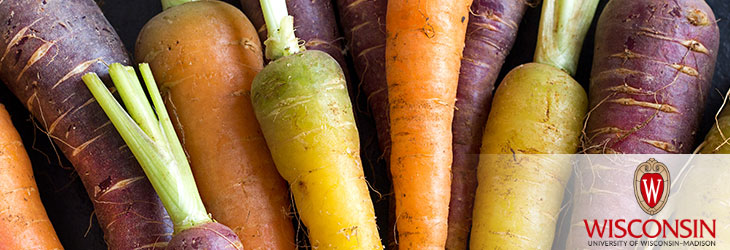Animals, Agriculture & Food

Soybeans with Increased Resistance to Sclerotinia Stem Rot and Drought Tolerance
WARF: P170294US03
Inventors: Mehdi Kabbage, Damon Smith, Ashish Ranjan
The Wisconsin Alumni Research Foundation (WARF) is seeking commercial partners interested in developing transgenic soybeans with increased resistance to a highly damaging fungal pathogen, as well as improved drought tolerance.
Overview
Sclerotinia sclerotiorum is a widespread fungal pathogen that is difficult to control and can cause considerable damage to crops. In soybean, this fungus causes Sclerotinia stem rot, also known as white mold. Yield losses exceeding 10 million bushels (270 million kg) per year are common.
The disease is a major problem for crop plants in the north-central United States and southern Canada. Although soybean cultivars have been identified that show partial resistance to Sclerotinia infection, resistance among commercial varieties is limited.
The disease is a major problem for crop plants in the north-central United States and southern Canada. Although soybean cultivars have been identified that show partial resistance to Sclerotinia infection, resistance among commercial varieties is limited.
The Invention
UW–Madison researchers have demonstrated that knocking down expression of a specific soybean respiratory burst oxidase homolog protein (GmRBOH-VI) leads to enhanced resistance to S. sclerotiorum and confers drought tolerance.
Using protein sequence similarity searches, the researchers identified seventeen GmRBOHs and studied their contribution to Sclerotinia disease development, drought tolerance and nodulation. Transcript analysis of all seventeen GmRBOHs revealed that out of the six identified groups, group VI (GmRBOH-VI) was specifically and drastically induced following S. sclerotiorum challenge. Virus-induced gene silencing of GMRBOH-VI resulted in enhanced resistance to the fungus and, coincidently, drought stress.
Based on these discoveries, the researchers have developed modified soybeans and production methods available for licensing.
Using protein sequence similarity searches, the researchers identified seventeen GmRBOHs and studied their contribution to Sclerotinia disease development, drought tolerance and nodulation. Transcript analysis of all seventeen GmRBOHs revealed that out of the six identified groups, group VI (GmRBOH-VI) was specifically and drastically induced following S. sclerotiorum challenge. Virus-induced gene silencing of GMRBOH-VI resulted in enhanced resistance to the fungus and, coincidently, drought stress.
Based on these discoveries, the researchers have developed modified soybeans and production methods available for licensing.
Applications
- Production of soybean lines resistant to Sclerotinia stem rot
- Commercial cultivars
Key Benefits
- Enhanced protection against stem rot/white mold
- The risk of long and severe drought is increasing worldwide.
Stage of Development
To further the development of this work, the researchers plan to generate transgenic plants where the relevant genes are knocked down or knocked out, and evaluate the performance of the plants against a wide range of abiotic and biotic stresses.
Additional Information
For More Information About the Inventors
Tech Fields
For current licensing status, please contact Emily Bauer at [javascript protected email address] or 608-960-9842